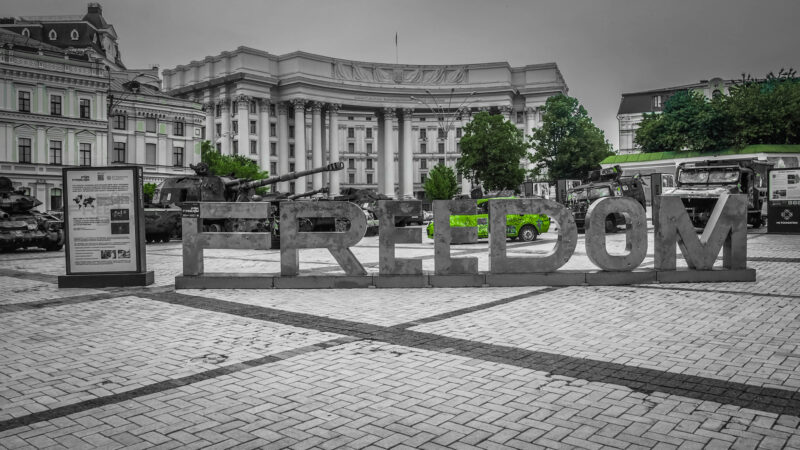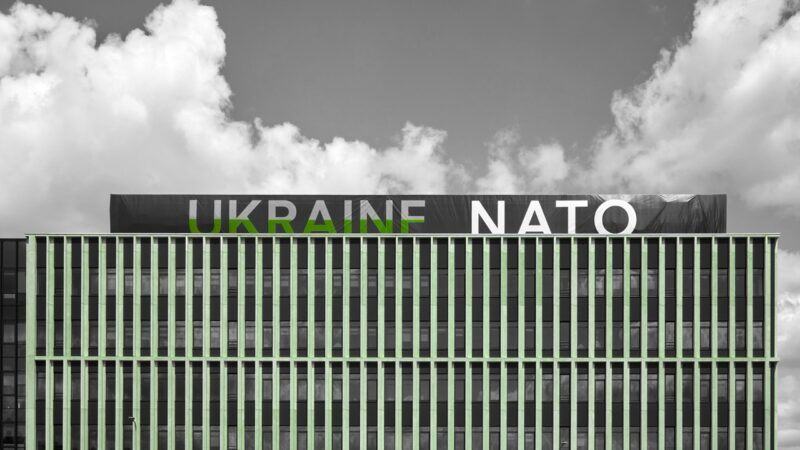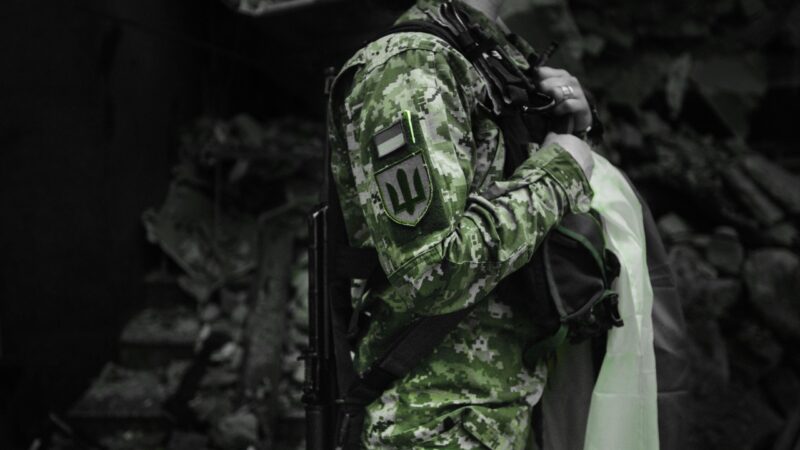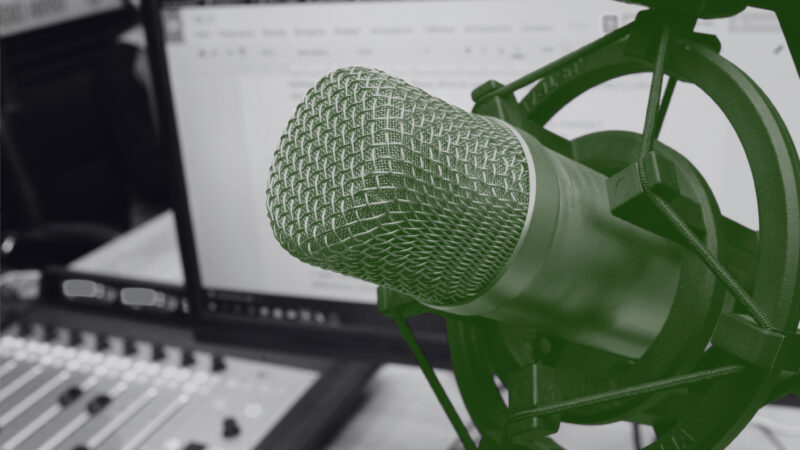The banality of Putin’s propaganda: A dangerous déjà vu
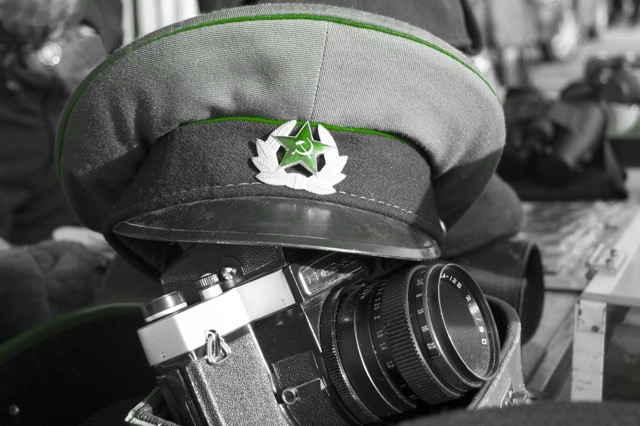
While Russia is continuing its aggression in Ukraine and the West is punishing Russia with economic sanctions and “cancel culture,” the biggest country in the world is irreversibly changing. The Russians are disappointed by the West, Russian President Vladimir Putin’s popularity is skyrocketing, and the war symbol “Z” (Latin consonant equivalent to the Cyrillic “З”) suggests:
Z: #Своих не бросаем! (svoyikh ne brosayem) — Z: We don’t abandon our own
Zа Россию! (za Rossiiu) — For Russia!
Zа мир без нацизма (za mir bez natsizma) — For a World [or For Peace] without Nazism!
The roots of this particular Russian reality reach back in its history to the Russian Empire and subsequent USSR, WWII, and the Cold War. Last century’s wars have never fully ended in the minds of many Russians, and have therefore crafted their world view and master narrative.
The letter “Z” has become a symbol of Russia’s war against Ukraine, appearing on military and civilian vehicles, administrative buildings, cultural institutions, and graffiti street art alike.
Putin’s enduring popularity is not accidental. He gives Russians what they have been missing since the fall of the Soviet Union in 1991—a surge of national pride and readiness to restore their former greatness.
Weaponization of memory
Russia has transformed from a monarchy, via the Soviet dictatorship, to a post-Soviet autocracy with the following constants: feelings of cultural superiority, undeserved suffering, and sacrificial patriotism.
Imperial Russian Army personnel made profound sacrifices for “Mother-Russia” and for the Tsar. After the October Revolution of 1917, sacrifices were made for Lenin, Stalin, and “an unbreakable union of free republics that Great Russia has united forever” (glorified in the Soviet national anthem). In the USSR, “Russian” and “Soviet” became interchangeable. Lenin became a symbol of cultural superiority, commemorated on the currency, in institutions, and at every central square of every city, town, and village of all 12 time zones of the Union.
As interpreted by the Kremlin, WWII—labelled in the USSR as the “Great Patriotic [Fatherland] War”—became an identity-crafting experience for the Soviet citizens. Speaking of sacrifices, 27 million of them (including 8 million Ukrainians) lost their lives, dying “For the Motherland, For Stalin!”
The Soviet Liberator-Soldier became the new hero, who freed Europe from the Nazi enemy. Every year Russia continues to honour this victory on May 9, with parades taking place all over the country.
The Cold War created another enemy: the USA/capitalistic West, based on an “us vs. them” dichotomy of morally superior, hardworking Soviets versus classist and racist Westerners. US President Ronald Reagan branded the USSR as “the Evil Empire.” Recently, President Putin retorted by framing the West as “the Empire of lies.” Putin has weaponized the Soviet cultural memory to both justify and glorify the Russo-Ukrainian War.
The banality of Putin
Putin rose to power in 2000, nine years after the fall of the USSR, which was followed by the economically and politically devastating 1990s. He succeeded as “one of us,” a hyper-masculine, decisive and fearless leader. A patriot.
Putin makes children’s wishes come true, drives a Lada “Kalina” to support the Russian automotive industry, and holds annual “hotlines” to address people’s urgent needs. He fishes, rides horses, and swims with dolphins. Popular slogans read “Without Putin there is no Russia” and “Strong President—Strong Russia.”
Putin transformed the state anthem of the USSR into Russia’s national anthem, using the same music and lyrics (!), with the latter only minimally modified by the original poet (!): “Lenin” was replaced by “God” and the “USSR” was replaced with “Russia, the age-old union of fraternal peoples.”
In 2005 Putin declared that the dissolution of the USSR was the “major geopolitical disaster of the 20th century.” His ambition to recreate the USSR manifested itself in different forms: the 2008 invasion of Georgia, the 2014 annexation of Crimea, the 2022 war in Ukraine. According to Putin’s world view, the proverbial Russian bear has simply been collecting its strayed cubs.
What the world considers the annexation of Crimea is considered by Russia to be a reunification. Putin emphasizes how Crimea is a historical part of Russia. Similarly, Putin has declared that the Donbas region has always been Russian and accused Ukraine of anti-Russian genocide in the area. When he proceeded with the “special military operation,” state-controlled Russian media and social media enthusiastically supported such claims.
Russia: “World War Z”
Criticism of Russia by the West is counterproductive. It unifies the Russians and promotes patriotism. Putin sets the tone, boasting that he is immune to the West’s criticisms and condemning the West, particularly the USA. While the USA is seen at least as a worthy adversary, Europe is considered by Russia to be weak, wimpy, and immoral, nicknamed “Gayropa.” The moniker points to homosexuality as a core European value and juxtaposes Europe as a degenerate civilization with Russia as a paradise of morality.
Today, the exodus of Western brands from Russia signals to them that they can no longer count on productive relations with the West. Regardless, Putin keeps reminding Russians that Russia will stay strong.
According to the Ministry of Economic Development of the Russian Federation, the heretofore strengthening national currency recently reached peak values. Meanwhile, media channels are reporting that anti-Russian sanctions are killing the global economy, a Moscow professor argues that sanctions have brought the West to its knees, and a Russian economist claims that for the USA, Ukraine’s war is a chance to make money. In reaction to sanctions and “cancel culture,” Putin declares with breathtaking duplicity that “the West tore off its mask of decency.” At least, after decades of enchantment with the Soviet Union and all things Russian, their lies are finally being recognized in the West.
In Putin’s Russia, the fusion of Soviet nostalgia and state-controlled propaganda is staggering. “Nazi Ukraine” has replaced “Nazi Germany.” In 2022 Russia, saving the world from Nazism means saving Ukrainians and “Russians in Ukraine” from a Kyiv regime that is supported by the profit-thirsty West. Even the Russian Orthodox Church supports the invasion of Ukraine. Inspired by the sacrality of memory of the Great Patriotic War against German Nazism, Russia is now leading another sacred war, against “Ukrainian Nazism.”
“Z,” the symbol of today’s Russia, is displayed everywhere, and Crimea is no exception. Russians are encouraged to put a “Z” on their clothing. Even the historic St. George’s Ribbon, which dates back to Imperial Russia and has evolved into a symbol of the Great Patriotic War, is twisted to resemble a “Z.” Russia’s military heavy weapons, and even trains with humanitarian aid going to the Donbas, are decorated with the “Z.”
The Russian youth—Putin’s own “generation Z”—are supportive of the president. Thousands of schoolchildren regularly join the “all-Russian Pioneers,” to provide additional support behind Russia’s war. School lessons focus on Russian heroism, duty, dignity, and patriotism.
Propelled by the Kremlin’s powerful propaganda, Russia continues to wage “World War ‘Z’” and it is not going to stop any time soon.
